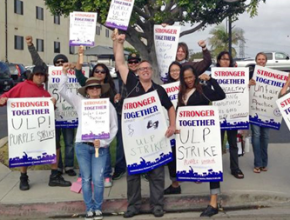Interpreters on the picket line
reports from San Diego on a 12-hour strike by sign language interpreters.
"CUTTING OUR health care is a sick idea!" read the signs carried by strikers on a picket line outside Purple Communications in San Diego, where American Sign Language (ASL) video relay service (VRS) interpreters staged a one-day Unfair Labor Practice work stoppage on May 5.
Workers say they walked out to pressure management to address their demand for a contract, and to register their anger at proposed health care cuts and continued workload increases.
The determination of the strikers, who are members of Pacific Media Workers Guild, TNG-CWA Local 39521, was on display for an inspiring 12 hours, as they were joined by local activists and community supporters from the start of Purple's workday at 6 a.m. until its close at 6 p.m.
Throughout the day, passing drivers honked their horns in support of the action--most notably San Diego Unified School District and the Metropolitan Transit System bus drivers, who may be pushed to stage a strike of their own later this year.
The San Diego strikers were joined by their fellow interpreters on picket lines at Purple locations in Oakland, Phoenix and Denver. Purple Communications provides video interpretation services in phone calls between ASL users on one side and English or Spanish speakers on the other.

The strike represents the latest step in a process that began with a unionization drive in November 2012, although the four worksites that participated in the work stoppage remain Purple's only unionized worksites.
The effort to unionize was ultimately driven by management's desire to increase the pace of work while simultaneously decreasing interpreters' break time. This has led to higher rates of workplace repetitive motion injuries (RMI) as the interpreters' arms, wrists and fingers suffer from the increased signing workloads.
This makes management's intention to cut health care benefits all the more egregious. A former video interpreter said:
Interpreters (much more patient than I) are fighting and don't want to give up on VRS because it's so necessary for deaf people. I was working far into burnout mode--way too much work for way too little pay, and no one gave a crap about the quality of my interpreting. [We] would be led on about bonus incentives that would quietly just get swept under the rug. Now they're threatening health care. All of the work that has been put into determining healthy work conditions for interpreters in the community doesn't seem to stand in VRS from my experience.
IN ADDITION to addressing these issues, the strikers are hoping that the work stoppage will compel management to grant them a contract--something no VRS interpreters from any VRS company have had before.
The tactical goal of the one-day strike was to threaten the subsidy Purple Communications receives from the Federal Communications Commission (FCC) in exchange for providing interpreting services free-of-charge for Deaf and Hard-of-Hearing (DHH) and hearing callers who require it. The company only receives its FCC subsidy if 80 percent of the incoming calls' average wait time to connect to an interpreter is one minute or less.
By stopping work for 12 hours at four different worksites, the overall wait-time of callers was increased, thus putting the subsidy in jeopardy. In this way, the interpreters were able to seriously threaten one of the company's main revenue sources while limiting the length of the stoppage (and thus the amount of lost wages workers have to endure) to a single workday.
The interpreters say they are hopeful that the threat to Purple's bottom line will be enough to convince management to decrease workloads, to shy away from the proposed health benefit cuts and‹significantly‹to award 144 video interpreters their first contract.
At stake is not only the quality of their livelihoods, but the quality of the interpretation services which both hearing and deaf consumers are dependent on to communicate with friends and family.
Because of the FCC subsidies received by Purple, these services are ultimately paid for by American taxpayers. The uniquely capitalist absurdity of this situation is that the very workers who actually provide VRS have been forced to sacrifice a day's worth of pay in order to make sure that taxpayer (read: working class) money from the FCC which is intended for that service actually goes to it.
Meanwhile, the managers who exercise control over that money and the interpreters' livelihoods are perfectly content to divert those funds away from a necessary and valuable social service and the people who provide it, and into the company's own private coffers instead.
Unfortunately, this situation is far from unique. But fortunately, neither is the courage of the Purple interpreters.


